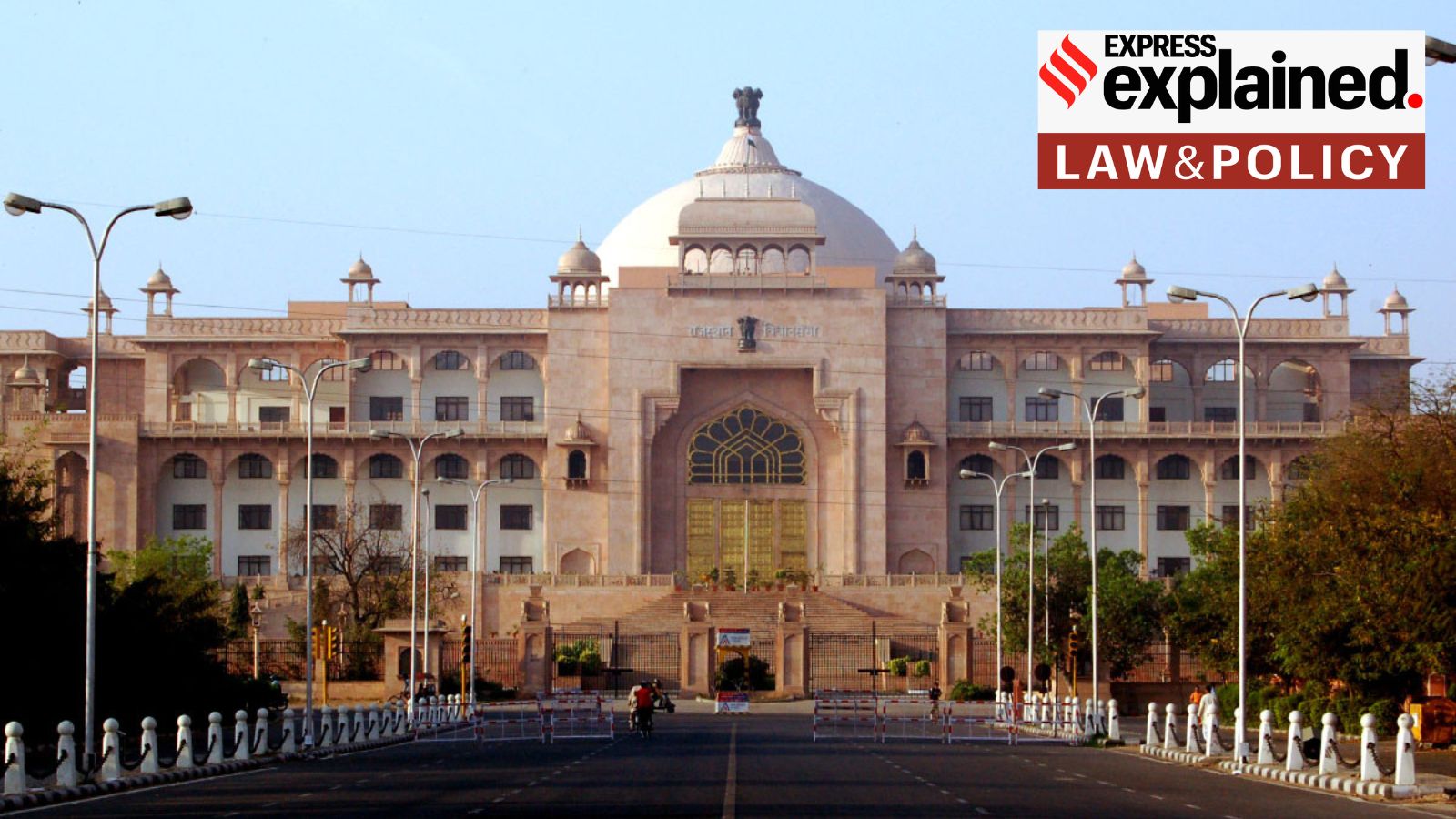The Rajasthan government on Wednesday (September 3) tabled in the Assembly the Rajasthan Prohibition of Unlawful Conversion of Religion Bill, 2025, after withdrawing a similar Bill that was tabled in February this year.
The new Bill expands on the earlier Bill, and has steeper penalties for violations. It has similarly exhaustive and dissuasive procedures for those wanting to convert under the proposed Act, while those “returning” to their ancestral religion have been exempted.

The Bill is expected to come up for discussion and passing on September 9, as per the Assembly’s Business Advisory Committee.
First, what was the need for this Bill?
The Bill says that in the recent past, many “gullible persons have been converted from one religion to another by misrepresentation, misinformation, force, undue influence, propaganda, coercion, allurement or by fraudulent means”, and there is a need to prohibit such conversion, including by marriage or on the pretext of marriage.
In an interview with The Indian Express last year, Rajasthan Law Minister Jogaram Patel had said the Bill (in its previous form) was being introduced to prevent forcible conversions, especially those of vulnerable communities such as tribals, and to check what the BJP calls “love jihad”, among other things.
The Bill states that marriages for the “sole purpose of unlawful conversion or vice-versa” will be declared void. Like the old Bill, the new one also puts the burden of proof on the person accused of carrying out the religious conversion, or their abettor. All offences will be cognizable and non-bailable.
In what ways is the new Bill different from the earlier version?
Story continues below this ad
In general, the new Bill expands the provisions of the old Bill and imposes heavier penalties.
* First, while marriage was already covered, the new Bill adds “pretext of marriage” under “allurement for conversion”. “Allurement” now includes “portraying practice, rituals and ceremonies or any integral part of a religion in a detrimental way vis-à-vis another religion; or glorifying one religion against another religion”.
* Second, a major change is the exception for “ghar wapsi”. “If someone returns to their mool (original) religion, which we call ghar wapsi, then these provisions will not be applicable to them,” Patel said.
The Bill states that “the return of any person already converted to his original religion i.e. ancestral religion shall not be deemed conversion.”
Story continues below this ad
* Third, the Bill makes provisions for attempts at conversion through digital means, detailing the use of social media and other online platforms for “online solicitation”.
* Fourth, the definition of “institutions” has been included to mean “all legal entities, educational institutions, orphanages, old age homes, hospitals, religious missionaries, non-governmental organisations and such other organisations of public character”.
* Fifth, “propaganda” has been added as “the systematic dissemination of information, ideas, or beliefs, including misinformation, through any medium (printed material, print media, social media, messaging applications, or any other digital mode), with the intent to cause or facilitate unlawful conversion…”
* Sixth, earlier, only the aggrieved or their blood relatives or those associated to them by marriage or adoption could lodge a complaint; now “any person” can lodge a complaint.
What are the penalties in the new Bill?
Story continues below this ad
* Those involved in unlawful conversion can be punished with a jail term of 7 to 14 years, along with a minimum fine of Rs 5 lakh. In the old Bill, the punishment was 1-5 years in jail and a minimum fine of Rs 15,000.
* In case of unlawful conversion of a minor, a differently abled person, a woman, or a person belonging to a Scheduled Caste or Scheduled Tribe (SC/ST), the punishment will be 10-20 years with a minimum fine of Rs 10 lakh. Earlier, this was 2-10 years with a minimum fine of Rs 25,000, with no specific provision for the differently abled.
* In case of an unlawful mass conversion, the imprisonment would be from 20 years to life, and a minimum fine of Rs 25 lakh. Earlier, this was 3-10 years with a minimum fine of Rs 50,000.
* The previous Bill had no mention of foreign funding; the new Bill states that receiving money from a foreign or illegal institution for religious conversion would carry an imprisonment of 10-20 years and a fine of at least Rs 20 lakh.
Story continues below this ad
* In certain special cases, such as inducing fear, using force, assault, promise of marriage, marriage, and trafficking or conspiring to traffic, the Bill proposes a minimum term of 20 years and a maximum of life in prison, and a minimum fine of Rs 30 lakh.
The fine money will go to the victim, and the court may award additional compensation of up to Rs 10 lakh.
* The new Bill also proposes a punishment of 20 years to life imprisonment and a minimum fine of Rs 50 lakh for repeat offenders.
* Following an investigation, the property used for the said illegal conversion can be seized or demolished, irrespective of whether it belongs to the person convicted under the Act or to someone else, and irrespective of whether it was used with or without the consent of the owner.
Story continues below this ad
* An institution or organisation involved in illegal conversion stands to have its licence or registration cancelled “forever”, have its property confiscated, its bank accounts frozen, and face a penalty of Rs 1 crore.
But what if someone wants to convert voluntarily?
There is an exhaustive process that could take a few months.
* First, details must be filled in a prescribed declaration form and submitted to the District Magistrate (DM) or an authorised Additional DM, 90 days in advance. Violations can invite 7-10 years’ imprisonment and a fine of at least Rs 3 lakh.
In the earlier version of the Bill, an advance notice of 60 days was required, and violations were punishable by a jail term between 6 months and 3 years, and a minimum fine of Rs 10,000.
Story continues below this ad
* Then, the “convertor” or the person performing the conversion ceremony, has to give 2 months’ advance notice to the DM or any other officer not below the rank of ADM, in a prescribed form. Violations will invite 10-14 years in prison and a minimum fine of Rs 5 lakh.
Earlier, the advance notice period was 1 month, and the violation invited 1-5 years’ imprisonment and a minimum fine of Rs 25,000.
* The DM will display the proposal of religious conversion on the notice board of the DM’s office, or those of the Tehsildar, Gram Panchayat, Local Self-Government, etc. In case an objection is raised, a time-bound inquiry will be conducted through the local police, the Revenue Department, the Social Justice and Empowerment Department, or Local Self-Government Department, etc., “with regard to genuine intention, purpose and cause of the proposed religious conversion,” preferably “within ten days”.
Earlier, the inquiry was proposed to be conducted only by the local police, and no time limit was specified.
Story continues below this ad
* In case a declaration is made after the conversion, it would have to be submitted in a prescribed form within 72 hours of the conversion; this window was 60 days earlier. The form would include the person’s photo identity card, Aadhaar, and other details.
The details would have to be displayed on a notice board, and objections would be invited. If any objections are received, an inquiry would be conducted.
Meanwhile, after filing this declaration, the person would have to appear before the DM within 10 days – it was 21 days earlier – to establish and confirm their identity.
Has there been any criticism of the provisions of the Bill?
Leader of Opposition Tika Ram Jully of the Congress said that Rajasthan has always been a land of communal harmony, and alleged that the government wants to vitiate this atmosphere of brotherhood for political gains. He pointed out that the government had, in response to a question asked by a BJP MLA in the Assembly, stated that no case has been registered in the state in relation to “love jihad”.
Jully said the Bill was “an attempt to divert attention from inflation, unemployment, corruption, broken roads, and collapsing schools”.
Have previous governments in Rajasthan tried to pass such a Bill before the attempts made this year?
An attempt to enact an anti-conversion law was made in 2006, when Vasundhara Raje, also of the BJP, was in her first term (2003-08) as Chief Minister. The Rajasthan Dharma Swatantraya Vidheyak (Rajasthan Freedom of Religion Bill, 2006) aimed to check religious conversions carried out by “force, allurement or by fraudulent means”.
At the time, the government had said: “It has been observed by the state government that some religious and other institutions, bodies and individuals are found to be involved in unlawful conversion from one religion to another by allurement or by fraudulent means or forcibly which at times has caused annoyance in the community belonging to other religions. The inter-religion fabric is weakened by such illegal activities and causes law and order problems.”
The Bill was passed by the state Assembly, but it was returned by then President Pratibha Patil following opposition from the Congress, human rights organisations, and minority groups, who claimed that the law had been proposed with the intention of harassing religious minorities, while appeasing Hindu groups.
In 2008, an amended version of the Bill with new provisions, including mandating prior approval of the concerned District Collector, was also stuck with the Centre.
Upon becoming CM for the second time (2013-18), Raje tried to get the 2008 Bill enacted, and pursued it with the Centre, but was unsuccessful. However, in 2017, the Rajasthan High Court issued guidelines to prevent “forcible conversions”.








































